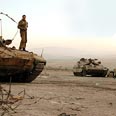
Thousands of soldiers head to border
Harsh fighting on Lebanon border, ongoing rocket fire lead to decision to significantly boost forces in north. Two more divisions to deploy along border; thousands of soldier to arrive at area, most of them reservists. IAF strikes about 20 targets in Lebanon Valley. Peretz: We have not plan to occupy Lebanon
Thousands of soldiers, most of them reservists, are also expected to arrive in the area, thus bringing the Israel Defense Forces' deployment in the north to a record of between three to four divisions (in terms of order of battle.)
The IDF is currently operating against Hizbullah strongholds beyond the border, and the fighting in the area has so far claimed the lives of six fighters – two of the Maglen unit and four of the Egoz unit.
On Friday morning the IDF began calling in reserve soldiers to assist forces already active on the various fronts and to allow active-duty forces to be deployed to the north. Several infantry and armored corps battalions began calling in reservists via special orders issued by Defense Minister Amir Peretz and IDF Chief of Staff Lieutenant-General Halutz.
The IDF is continuously sending forces to the north, including artillery and armor forces and infantry corps. Most of the missions in the border area, as in the case of the Gaza Strip operations, are conducted by soldiers on their compulsory service, thus creating a vacuum in these forces' regular stations.
Defense Minister Amir Peretz referred to the comprehensive enlistment of reservists while visiting injured soldier at the Rambam Medical Center.
"We are considering the extent of forces, and the areas of operation will be in accordance to the operational needs. We have no plan to get dragged into any move that Hizbullah is planning to drag us into. However, we will operate in any place where a decision is required," he said.
According to Peretz, there is need for a diplomatic move to back the military operation.
"The military operation is not enough. I believe that when it is completed new conditions will be created which will lead to an accelerated diplomatic process. I met here families who feel that the sons' injury is serious, but they ask that the injury will not be in vain, that reality changes, that we will not continue to face a situation in which missiles are fired at the Israeli home front so easily, and I promise them that the IDF will continue to operate sensitively but also firmly. This is a very important test period," he said.
The defense minister made it clear that the State of Israel has no plan to occupy Lebanon.
"There is no war with the Lebanese people. This is an uncompromising war with terror organizations. We will operate where it takes and with the required means," he explained.
Referring to the kidnapped soldiers, Peretz said: "It is still too early to talk about a solution that will bring calm and return our abducted soldiers. As far as we are concerned, returning the captives home is one of the main things, perhaps one of the main tools which will lead to dynamics that will bring about the overall solution."
Air Force continues to pound Hizbullah strongholds
Meanwhile, the Israel Air Force's wide-scale operation continued. On Friday afternoon, aircrafts struck approximately 20 targets in the Baalbeck area in the northern Lebanon Valley, Arab news agencies reported.
According to the reports, five people were killed and 17 were injured in the strikes. Security forces in Lebanon reported that 330 people have been killed since the IDF began striking in Lebanon.
Lebanese sources reported of a lot of destruction caused as a result of the IDF's strikes in the Lebanon Valley area and of a deteriorating humanitarian situation. In the past few days, the IDF has struck a series of targets all across the area.
News agencies reported that IDF aircrafts bombed part of Lebanon's longest bridge, which was seriously damaged.
In a different incident, shells or rockets landed on the United Nations Interim Force's main base in southern Lebanon, north of Rosh Hanikra. IDF officials said that the a barrage of rockets fired by Hizbullah hit the base, while the al-Manar television station claimed that the IDF fired artillery shells at the area near the base.
IDF officials reported that after a barrage of rockets was fired at northern communities Friday afternoon, the Air Force struck two launching cells in southern Lebanon. In addition, the IAF struck launching sites, access routes, two vehicles and bridge in southern Lebanon.
Two Hizbullah headquarters and the organization's communication infrastructures were also attacked, the army said.
Lebanese residents reported also on Friday that IAF aircrafts dropped leaflets in southern Lebanon, calling on residents of the villages to leave their homes. According to the report, in the leaflets the residents were asked to travel north of the Litani river due to the IAF's plan to bomb the area.
Sharon Roffe-Ofir and Roee Nahmias contributed to the report










